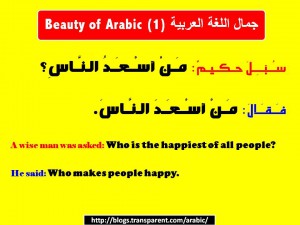Beauty of the Arabic Language (1) Posted by Fisal on Jan 30, 2016 in Arabic Language, Grammar, Vocabulary
Ahlan أهــْــلاً , Arabic lovers! Today’s post will be the first of a series to explore the beauty of the Arabic language through the study of some special phrases and sentences. I will explain the sentence or phrase, translate it and compare it to a similar one. We will also explore the importance of diacritics (word endings) in determining the correct meaning of a word. We will do a full sentence grammatical analysis, too. Happy learning!

Beauty of Arabic (1)
ســُــئــِــلَ حــَــكــيــمٌ: مــَــنْ أســْــعــَــدُ الــنــَّــاسِ؟
A wise man was asked: Who is the happiest of all people?
فــَــقــَــالَ: مــَــنْ أســْــعــَــدَ الــنــَّــاسَ.
So he said: Who makes people happy.
The photo and the dialogue above tell a small story of a wise man being asked a small question. When the wise man replied, he used the very same words. He just changed the endings. His reply was both short and eloquent. Let’s analyze in further detail.
- ســُــئــِــلَ (= was asked) is a passive verb in the past tense. This verb is Mabni on the fat’h (it has a Fat’ha on its ending).
- حــَــكــيــمٌ (= a wise man) is the deputy agent of the passive verb and it is Mabni on the Damm (it has a Dammah on its ending).
- مــَــنْ (= Who?) is an interrogative noun that is Mabni on the Sukooun. This noun is also a fronted predicate (Khabar خـبـر مـقـدم) to the the subject (Mubtada) أســعــدُ that follows.
- أســْــعــَــدُ (= the happiest) is a superlative noun اسـم تـفـضـيـل and is the subject (Mubtada مـبـتـدأ) of the fronted predicate. It is Mabni on the Damm (it has a Dammah on its ending).
- الــنــَّــاسِ (= people) is a Mudaaf noun that is Majrour (in the genitive case) with the Kasrah.
- فــَــقــَــالَ (= So he said) the Faa (= so) is a particle for commenting and the verb قــالَ is a past verb that is Mabni on the fat’h. The subject of the verb is the Invisible (third person) Pronoun (he) that refers back to the (wise man).
- مــَــنْ (= Who) is a relative noun that is Mabni on the Sukoon. It is also the predicate of a deleted subject (Mubtada).
- أســْــعــَــدَ (= makes someone happy) is a past verb that is Mabni on the Fat’h. The subject of this verb is the deleted pronoun (he).
- الــنــَّــاسَ (= people) is the object مــفــعــول of the verb (أسـعـدَ) and is Mansoub (in the accusative case) with the Fat’ha (it has a Fat’ha on its ending).
The short answer to the question should translate as follows:
أســْــعــَــدُ الــنــَّــاسِ هــُــو مــَــنْ أســْــعــَــدَ الــنــَّــاسَ.
The happiest of all people is the one who makes people happy.
Also, the answer can be like this:
مــَــنْ أســْــعــَــدَ الــنــَّــاسَ هــُــو أســْــعــَــدُ الــنــَّــاسِ.
He who makes people happy is the happiest of all people.
*****
Check us back Soon!
Peace ســلام /Salam/

Build vocabulary, practice pronunciation, and more with Transparent Language Online. Available anytime, anywhere, on any device.
About the Author: Fisal
Well, I was born near the city of Rasheed or Rosetta, Egypt. Yes, the city where the Rosetta Stone was discovered. It is a small city on the north of Egypt where the Nile meets the Mediterranean. I am a Teacher of EFL.



